

Suicide Prevention. Suicide prevention and mental wellness services for Indigenous communities.
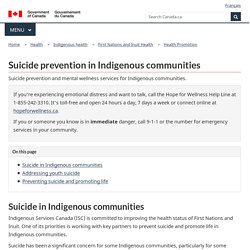
If you're experiencing emotional distress and want to talk, call the Hope for Wellness Help Line at 1-855-242-3310. It's toll-free and open 24 hours a day, 7 days a week or connect online at hopeforwellness.ca. If you or someone you know is in immediate danger, call 9-1-1 or the number for emergency services in your community. Suicide in Indigenous communities Indigenous Services Canada (ISC) is committed to improving the health status of First Nations and Inuit.
Suicide has been a significant concern for some Indigenous communities, particularly for some located in the North and in remote areas. Addressing youth suicide Suicide is a leading cause of death for youth in Canada. 4 Diseases Impacting Health on First Nations in Canada. This month, Indigenous leaders have had a lot to say about actions taken by the federal government.
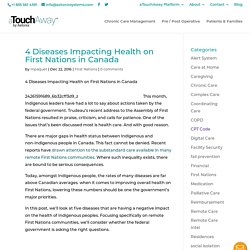
Trudeau’s recent address to the Assembly of First Nations resulted in praise, criticism, and calls for patience. One of the issues that’s been discussed most is health care. Aboriginal Diabetes Initiative Program Framework 2010 - 2015. HC Pub.: 110146 Cat.: H34-156/2011E ISBN: 978-1-100-19065-5 Table of Contents 1.0 Why was the Aboriginal Diabetes Initiative (ADI) Created?
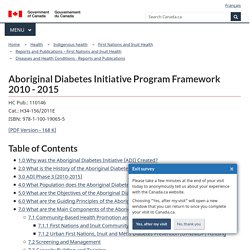
Protecting people at greater risk. Some people may be at greater risk of exposure to chemicals and pollutants.
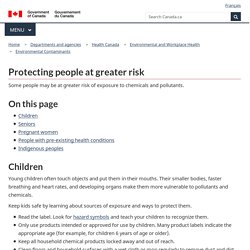
On this page Children Young children often touch objects and put them in their mouths. Their smaller bodies, faster breathing and heart rates, and developing organs make them more vulnerable to pollutants and chemicals. Keep kids safe by learning about sources of exposure and ways to protect them. Read the label. Seniors If you spend more time indoors, have a reduced immune system, or other medical conditions, you may be particularly vulnerable to certain chemicals and pollutants around the home.
Read the label. Pregnant women Not only can your own health be jeopardized, but exposure to chemicals can harm your unborn child, too. To stay healthy before and during your pregnancy, avoid exposure to chemicals and pollutants as much as possible. Read the labels on chemical products. People with pre-existing health conditions It's important to prevent unnecessary exposure and protect yourself. Indigenous Peoples in Canada.
Care of vulnerable populations. Vulnerable populations are defined as groups who are at increased risk of receiving a disparity in medical care on the basis of financial circumstances or social characteristics such as age, race, gender, ethnicity, sexual orientation, spirituality, disability, or socioeconomic or insurance status.
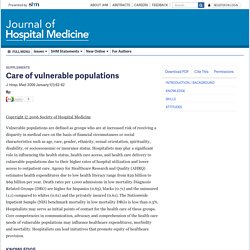
Hospitalists may play a significant role in influencing the health status, health care access, and health care delivery to vulnerable populations due to their higher rates of hospital utilization and lower access to outpatient care. Agency for Healthcare Research and Quality (AHRQ) estimates health expenditures due to low health literacy range from $29 billion to $69 billion per year. Death rates per 1,000 admissions in low mortality Diagnosis Related Groups (DRG) are higher for hispanics (0.65), blacks (0.71) and the uninsured (1.1) compared to whites (0.61) and the privately insured (0.61).
The Nationwide Inpatient Sample (NIS) benchmark mortality in low mortality DRGs is less than 0.5%. Vulnerable populations in healthcare. - PubMed - NCBI. Creating conditions for Canadian aboriginal health equity: the promise of healthy public policy. Indigenous health disparities: a challenge and an opportunity. DEFINE_ME. Canada’s Biggest Health Problem: Indigenous Health. Alison Reiheld calls attention to André Picard’s assertion that Indigenous health is currently the most urgent issue in Canada.
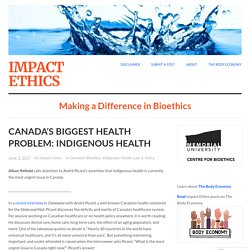
In a recent interview in Chatelaine with André Picard, a well-known Canadian health columnist for the Globe and Mail, Picard discusses the deficits and merits of Canada’s healthcare system. For anyone working on Canadian healthcare or on health policy anywhere, it is worth reading. He discusses dental care, home care, long-term care, the effect of an aging population, and more. One of his takeaway quotes no doubt is “Nearly 40 countries in the world have universal healthcare, and it’s all more universal than ours.” But something interesting, important, and under-attended is raised when the interviewer asks Picard, “What is the most urgent issue in Canada right now?”
8 key issues for Indigenous Peoples in Canada. Eight of the key issues that are of greatest concern for Indigenous Peoples in Canada are complex and inexorably intertwined - so much so that government, researchers, policy makers and Indigenous leaders seem hamstrung by the enormity.
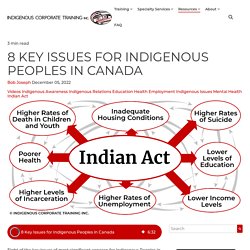
It is hard to isolate just one issue as being the worst. The Indian Act greatly contributes to these eight issues and more. Be sure to read this article 21 things about the Indian Act, if you want to know the intent and extent of the Act. Watch our video on this blog article here. Indigenous health.